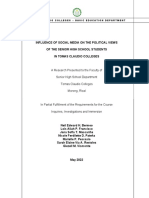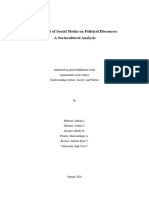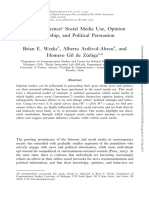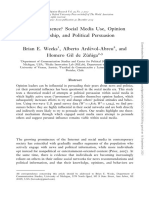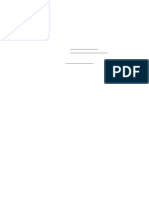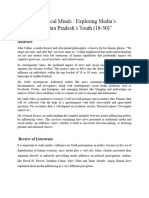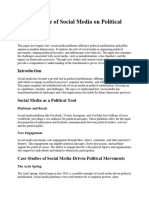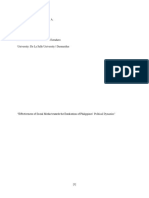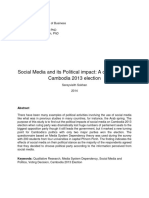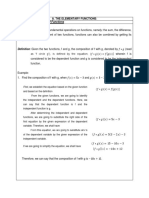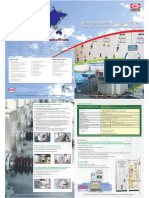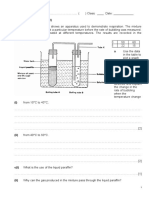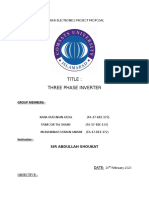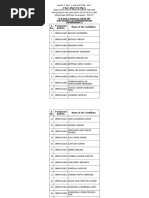The Influence of Social Media Usage and Political Behaviors Qvo7i815
The Influence of Social Media Usage and Political Behaviors Qvo7i815
Uploaded by
CYRUSCLARENCE BUALCopyright:
Available Formats
The Influence of Social Media Usage and Political Behaviors Qvo7i815
The Influence of Social Media Usage and Political Behaviors Qvo7i815
Uploaded by
CYRUSCLARENCE BUALOriginal Title
Copyright
Available Formats
Share this document
Did you find this document useful?
Is this content inappropriate?
Copyright:
Available Formats
The Influence of Social Media Usage and Political Behaviors Qvo7i815
The Influence of Social Media Usage and Political Behaviors Qvo7i815
Uploaded by
CYRUSCLARENCE BUALCopyright:
Available Formats
Journal of Communication and Management, 2023;2(2):98-100
Journal of Communication and Management
ISSN: 2583-617X (Online)
Journal home page: https://jcoma.com
Research Article DOI: 10.58966/JCM2023224
The Influence of Social Media Usage and Political Behaviors among
Adults
Lalitank Jain1*, Vyomkesh Pandey2
1
Faculty of Journalism & Mass Communication, Makhanlal Chaturvedi National University of Journalism and Communication, Bhopal, Madhya Pradesh,
India.
2
Assistant Professor, Department of Advertising, Kushabhau Thakre Journalism And Mass Communication University, Raipur, Chhattisgarh, India
ARTICLE INFO ABSTRACT
Article history: This research paper examines how social media influences how young adults engage in politics. The study
Received: 02 April, 2023 examines the connection between political behaviour and social media use. The study was carried out using
Revised: 25 may, 2023 a survey that was given to a sample of young adults between the ages of 18 and 29. Regression analysis and
Accepted: 10 June, 2023 descriptive statistics were used to analyse the survey results. The results show that young adults' political
engagement is significantly impacted by their use of social media. According to the findings, young adults
Published: 30 June, 2023 who use social media are more likely to be politically active and have a deeper understanding of politics
Keywords:
Social-Media, Political
Participation, Adults, Political
Behaviour, Digital citizenship
Introduction of communit ies cent red on shared interest s has
Young adults are increasingly using social media as a fundamentally changed how we relate to and communicate
platform for political engagement. However, the study also (Aaron, (2012).) Politics is one of the fields where social
discovered that using social media can result in polarisation media has made a significant difference. For many people,
and echo chambers, which may have detrimental effects especially young adults, social media platforms have
on political discourse and democracy Towner & Dulio, taken the place of traditional media as their main source
2012). People can now access information, participate in of political news and information. Young adults are an
political debates, and support political campaigns thanks important demographic for political engagement as they
to the growth of social media. There is, however, little are the future of our society (Social media and politics
data on how social media affects young adults’ political in central and Eastern Europe. Routledge., 2017). With
engagement (Kasmani et al., 2014). By analyzing the over 3.8 billion active social media users worldwide,
connections between social media use and young adults’
social media has become a powerful tool for political
political knowledge, attitudes, and behaviors, this research
communication and mobilization, allowing political actors
article aims to close this knowledge gap (Zhuravskaya et
to reach a large audience quickly and affordably (Stieglitz
al., 2020).
& Dang-Xuan, 2013a). Despite their growing involvement
Background in political activities, young adults are frequently seen as
Social media plat for ms have quick ly become an a politically disengaged group. A unique opportunity to
indispensable part of our daily lives. The development involve young adults in political discourse and mobilization
of new forms of social interaction and the formation exists thanks to social media (M. D. Safiullah et al., 2022).
*Corresponding Author: Lalitank Jain
Address: Faculty of Journalism & Mass Communication, Makhanlal Chaturvedi National University of Journalism and Communication, Bhopal,
Madhya Pradesh, India
Email : Mr.lalitank@gmail.com
Relevant conflicts of interest/financial disclosures: The authors declare that the research was conducted in the absence of any commercial or
financial relationships that could be construed as a potential conflict of interest.
© 2023, Lalitank Jain This is an open access journal, and articles are distributed under the terms of the Creative Commons
Attribution‑NonCommercial‑ShareAlike 4.0 License, which allows others to remix, tweak, and build upon the work non‑commercially, as
long as appropriate credit is given and the new creations are licensed under the identical terms. under the terms of the Creative Commons
Lalitank Jain
Problem Statement Research Methods
Although social media plays an increasingly significant A sample of young adults between the ages of 18 and 29
role in political communication and mobilization, little was given a survey to complete as part of the research. The
is known about how it affects young adults’ interest in survey asked questions about political knowledge, social
politics (M. Safiullah et al., 2017). The relationship between media use, attitudes, and behaviors. Online distribution
using social media and participating in politics has been channels for the survey included social media and email.
the subject of some studies. The findings have been 300 responses in total were gathered and examined.
conflicting, and it’s still unclear why there is a connection.
Furthermore, it’s unclear to what extent young adults’ Results and Findings
use of social media influences their political awareness,
viewpoints, and behavior (Biswas et al., 2014). Descriptive Statistics
Social Media Use and Political Behaviors The study’s
Research Objectives findings revealed that social media use was linked to
This study aims to look at how young adults get involved in online and offline political behaviors among young adults.
politics and how they use social media. The specific goals People who claimed to use social media for political
of this study are to: purposes were more likely to engage in political activities
• Explore the relationship between social media use and such as discussing politics and sharing political content
political behaviors among young adults. online. However, they were not more likely to engage in
• Look at the possible good and bad effects of young adults traditional political activities like voting or attending
using social media for their political involvement. political events.
The study gathered information from 300 young adults
Research Significance between the ages of 18 and 29 who responded to an online
This study is important for a number of reasons. First survey. In order to provide a summary of the sample
off, it adds to the body of knowledge on how social characteristics and social media usage patterns, the data
media affects political participation, particularly among were analyzed using descriptive statistics. The findings
young adults. Second, it sheds light on the mechanisms revealed that the majority of respondents (85%) reported
underlying the link between political participation and using social media at least once a day, with Facebook being
social media use. Thirdly, it draws attention to social the most popular platform (82%). 45% of those surveyed
media’s potential advantages and disadvantages in terms said they were politically active and used social media for
of political participation, with implications for social media campaigning (e.g. following political candidates or issues).
companies, political actors, and policymakers. Finally, the Bivariate Analysis
results of this study can be used to guide media literacy
The study used bivariate analyses to examine the
programmes and initiatives that foster critical thinking in
connections between young adults’ social media use and
order to encourage a more informed and involved citizenry.
political behaviors. According to the findings, a strong
positive correlation exists between social media use and
Literature Review political knowledge (r=.25, p.001) and positive political
Studies have shown that young adults who use social media attitudes (r=.17, p.01).
have greater political knowledge. According to studies,
using social media can increase exposure to political Multivariate Analysis
information, which can enhance one’s understanding of Multiple regression analyses were used in the study to
politics (M. D. Safiullah et al., 2022). According to other examine how the use of social media and other factors
studies Stieglitz & Dang-Xuan, 2013b, using social media affect young adults’ interest in politics in their own
can exacerbate partisan division by making it easier for unique ways (r=-.13, p.05). Fortunately, social media
echo chambers and filter bubbles to form (Zhuravskaya use and political compromise had a significant negative
et al., 2020). Social media platforms like Twitter and correlation. After adjusting for demographic factors
Facebook have also been found to facilitate political (age, gender, and education), the results showed that
discussion and information sharing. Due to the difficulty social media use significantly predicted online political
in hearing opposing viewpoints created by these echo behaviors (=.14, p.01). The study also looked at potential
chambers and filter bubbles, political attitudes and beliefs moderating factors, such as political ideology, use of social
may become more entrenched. By making it simpler to media platforms, and how often people use social media.
disseminate information and calls to action, social media The findings demonstrated that political ideology
can increase political participation and mobilization (M. moderated (=.13, p.05) the relationship between social
Safiullah et al., 2017) have discovered that Facebook and media use and political knowledge, with the relationship
other social media platforms are effective at enlisting being stronger for respondents who identified as liberal.
people in politics, particularly young adults. The relationship between social media use and online
Journal of Communication and Management, April-June, 2023, Vol 2, Issue 2, 98-100 99
Lalitank Jain
political behaviors was also moderated by the social media users among young adults are more likely to be
media platform used (=.16, p.01), with the relationship politically active and have a deeper understanding of
being stronger for respondents who reported using politics. The results of this study demonstrate that social
Twitter. The relationship between social media use and media has both positive and negative effects on young
political knowledge was finally moderated by frequency adults’ political participation. The study also discovered
of use (=.25, p.001), with the relationship being stronger that using social media can result in polarisation and echo
for respondents who reported using social media more chambers, which may have detrimental effects on political
frequently. discourse and democracy. Use of social media can boost
political awareness and participation, but it can also create
Limitations polarization and echo chambers. Teaching young adults
The study has a number of limitations that should be how to use media and engage in critical thought will help
noted. First, a convenience sampling technique was used them navigate social media’s challenging and occasionally
to select the sample, which may have limited how broadly divisive world. Future studies should look at how social
the results can be applied to other populations. Second, media affects political participation across a range of
the study used self-reported data, which can be subject contexts and age groups.
to recall bias or social desirability bias. Finally, the study
was cross-sectional in nature, which restricts our ability to Bibliography
draw causal conclusions about the relationships between 1. Biswas, et al. (2014). Influence of social media on voting behaviour.
social media use and political engagement. Despite these Journal of Power, Politics & Governance, 2(2), 127–155.
limitations, the study offers important insights into these 2. Kasmani, et al. (2014). Can Twitter be an Effective Platform for
Political Discourse in Malaysia? A Study of #PRU13. Procedia - Social
relationships among young adults and highlights any and Behavioral Sciences, 155, 348–355. https://doi.org/10.1016/j.
potential moderating factors that may affect them. sbspro.2014.10.304
3. Safiullah, et al. (2022). The impact of social media and news media
Conclusion on political marketing: an empirical study of 2014 Indian General
Election. International Journal of Business Excellence, 26(4), 536.
In the end, the study’s findings demonstrate that young https://doi.org/10.1504/IJBEX.2022.122765
adults who use social media tend to have more political 4. Safiullah, et al. (2017). Social media as an upcoming tool for political
marketing effectiveness. Asia Pacific Management Review, 22(1),
knowledge, attitudes, and online political behaviors. 10–15. https://doi.org/10.1016/j.apmrv.2016.10.007
However, political polarisation and limited influence on 5. Stieglitz, S., & Dang-Xuan, L. (2013). Social media and political
offline political behaviors may also be caused by social communication: a social media analytics framework. Social
media use. The relationship between social media use Network Analysis and Mining, 3(4), 1277–1291. https://doi.
org/10.1007/s13278-012-0079-3
and political engagement was moderated by political 6. Towner, T. L., & Dulio, D. A. (2012). New Media and Political
ideology, social media platform use, and frequency of Marketing in the United States: 2012 and Beyond. Journal of Political
use. The survey results show that young adults’ use of Marketing, 11(1–2), 95–119. https://doi.org/10.1080/15377857.2
social media significantly impacts how involved they 012.642748
7. Zhuravskaya, E., Petrova, M., & Enikolopov, R. (2020). Political
are in politics. However, the impact of social media on Effects of the Internet and Social Media. Annual Review of
political engagement may vary depending on individual Economics, 12(1), 415–438. https://doi.org/10.1146/annurev-
and contextual factors. According to the study, social economics-081919-050239
HOW TO CITE THIS ARTICLE: Jain, Lalitank ., Pandey, V. (2023).The Influence of Social Media Usage and Political Behaviors among Adults. Journal
of Communication and Management, 2(2), 98-100. DOI: 10.58966/JCM2023224
100 Journal of Communication and Management, April-June, 2023, Vol 2, Issue 2, 98-100
You might also like
- Impact of Social Media To Students Political AwarenessDocument22 pagesImpact of Social Media To Students Political Awarenessjeanybabes soler67% (12)
- Chapter 7 Test BDocument4 pagesChapter 7 Test Belvisfan77760% (5)
- A Farewell To Alms Clark en 9377.simpleDocument10 pagesA Farewell To Alms Clark en 9377.simpleNathan LaingNo ratings yet
- An Analysis of The Social Media Contents in Forming The Political Attitudes of Social Media UsersDocument326 pagesAn Analysis of The Social Media Contents in Forming The Political Attitudes of Social Media UsersWimble Begonia Bosque100% (1)
- Reading Drwing PFD's and P & ID'S - OctoberDocument72 pagesReading Drwing PFD's and P & ID'S - OctoberAhmed ElShora100% (5)
- Artical 297Document9 pagesArtical 297ton tonNo ratings yet
- Students Exposure to Social Media and Their RadicDocument14 pagesStudents Exposure to Social Media and Their RadicCarla Dela CruzNo ratings yet
- Students Exposure To Social Media and TH 570c8c27Document14 pagesStudents Exposure To Social Media and TH 570c8c27nooneknowsNo ratings yet
- GB - Final Research PaperDocument32 pagesGB - Final Research PaperPateña Nicole Ferdilette DiñozoNo ratings yet
- The Impact of Social Media On Political Discourse 1Document7 pagesThe Impact of Social Media On Political Discourse 1Adrian Ladines BedasuaNo ratings yet
- SOCIODEMOGRAPHICCHARACTERISTICSSOCIALMEDIAUSEPOLITICALAGENDAFILIPINOVALUESANDSOCIALMEDIAINTERACTIONASDETERMINANTSOFELECTIONPARTICIPATIONAMONGYOUNGADULTFILIPINOSDocument16 pagesSOCIODEMOGRAPHICCHARACTERISTICSSOCIALMEDIAUSEPOLITICALAGENDAFILIPINOVALUESANDSOCIALMEDIAINTERACTIONASDETERMINANTSOFELECTIONPARTICIPATIONAMONGYOUNGADULTFILIPINOSFrancis FrancisNo ratings yet
- Does Social Media Usage Influence Youth'S Interest in Politics?Document7 pagesDoes Social Media Usage Influence Youth'S Interest in Politics?LarissaNo ratings yet
- Reference Citations in RRLDocument3 pagesReference Citations in RRLJohnroe VillafloresNo ratings yet
- The Impact of Social Media On Political DiscourseDocument7 pagesThe Impact of Social Media On Political DiscourseAdrian Ladines BedasuaNo ratings yet
- Peer Interactions ReferenceDocument26 pagesPeer Interactions ReferencerdescabarteNo ratings yet
- Online Influence Social Media Use, OpinionDocument26 pagesOnline Influence Social Media Use, OpinionDear EnakaliNo ratings yet
- 978-3-030-20671-0_33Document10 pages978-3-030-20671-0_33beckydas117No ratings yet
- Use of Social Networking Media in PolitiDocument8 pagesUse of Social Networking Media in Polititayefm0No ratings yet
- Research of Group 5 For EditingDocument33 pagesResearch of Group 5 For EditingLloyd BarroNo ratings yet
- temmy standard2Document10 pagestemmy standard2stephanietubbasjonestransitNo ratings yet
- New research 1.Document20 pagesNew research 1.Ceejay Evanglista AvelinoNo ratings yet
- Social Media and Political Participation PDFDocument20 pagesSocial Media and Political Participation PDFJohnroe VillafloresNo ratings yet
- Review of Related Literature in Arellano Elisa Esguerra Campus in Practical Research-1 Effects of Social Media On Political StanceDocument6 pagesReview of Related Literature in Arellano Elisa Esguerra Campus in Practical Research-1 Effects of Social Media On Political StanceKelvin Benjamin RegisNo ratings yet
- Cirr 500 2021 J DalleDocument27 pagesCirr 500 2021 J DalleApe DieNo ratings yet
- Political Influence of Social Media On Younger and Older GenerationsDocument2 pagesPolitical Influence of Social Media On Younger and Older GenerationszsuzsannaeorsiNo ratings yet
- 10.1515 - Omgc 2022 0006Document17 pages10.1515 - Omgc 2022 0006Arnav BhosaleNo ratings yet
- Social Media For Political Mobilization in India A Study 2165 7912 1000275Document4 pagesSocial Media For Political Mobilization in India A Study 2165 7912 1000275Fame KarakNo ratings yet
- Citizenship Robson Xenos 2014Document18 pagesCitizenship Robson Xenos 2014PakornTongsukNo ratings yet
- Edv 050Document26 pagesEdv 050xxzipper1No ratings yet
- UntitledDocument4 pagesUntitledErykah Gheil OrsolinoNo ratings yet
- Chapter 1 Group 7Document3 pagesChapter 1 Group 7Irishh TrinidadNo ratings yet
- Ashwin BRM 2Document4 pagesAshwin BRM 2jayanth jNo ratings yet
- The Mobilization Effect of Social Media UseDocument16 pagesThe Mobilization Effect of Social Media Usehanisah azharNo ratings yet
- Social Media Exposure Societal EngagemenDocument118 pagesSocial Media Exposure Societal EngagemenEzequias BitancorNo ratings yet
- Rough DraftDocument16 pagesRough DraftsiddhantrajNo ratings yet
- Tam Bar I Journal BukDocument23 pagesTam Bar I Journal BukDan OkoloNo ratings yet
- Government FinalDocument7 pagesGovernment FinalJonah Jatte MunezNo ratings yet
- PRP, Abdimutalip AbilkhaiyrDocument7 pagesPRP, Abdimutalip Abilkhaiyrabuhurayra501324No ratings yet
- Untitled DocumentDocument5 pagesUntitled DocumentJohnroe VillafloresNo ratings yet
- Revisiting Civic Voluntarism Predictors of College Students' PoliticalDocument8 pagesRevisiting Civic Voluntarism Predictors of College Students' PoliticalLUO TONGBIN “George” / UPMNo ratings yet
- Chapter 2Document13 pagesChapter 2kervie BaruizNo ratings yet
- 16 J Isoss 7 2Document13 pages16 J Isoss 7 2Syed Anwaar Ul HassanNo ratings yet
- The_effects_of_social_media_use_and_poliDocument19 pagesThe_effects_of_social_media_use_and_poliedlordviadanNo ratings yet
- 1 PBDocument7 pages1 PBArshyaNo ratings yet
- Final EssayDocument4 pagesFinal EssaymbasogobillyNo ratings yet
- Abs, Lit, Intro, Sec 2Document25 pagesAbs, Lit, Intro, Sec 2spasumar5No ratings yet
- Political Communication in Social Media A BibliomeDocument15 pagesPolitical Communication in Social Media A BibliomeselenaaraujodaNo ratings yet
- Pr2 g9 PreliminariesDocument12 pagesPr2 g9 Preliminariessheana monacilloNo ratings yet
- The Influence of Social Media On Political MobilizationDocument5 pagesThe Influence of Social Media On Political MobilizationjvepuriNo ratings yet
- g3 Research 1 5 Banaag Calaluan Racelis Rondero Final Draft WithgrDocument60 pagesg3 Research 1 5 Banaag Calaluan Racelis Rondero Final Draft WithgrJane BanaagNo ratings yet
- The Role Social Media Play in Political MovementsDocument30 pagesThe Role Social Media Play in Political Movementsirfan.pzs11No ratings yet
- Social Sciences: Boomers Versus Millennials: Online Media Influence On Media Performance and Candidate EvaluationsDocument20 pagesSocial Sciences: Boomers Versus Millennials: Online Media Influence On Media Performance and Candidate Evaluationsnicole pinyaNo ratings yet
- Effectiveness of Social Media Towards The Eradication of Philippines' Political DynastiesDocument14 pagesEffectiveness of Social Media Towards The Eradication of Philippines' Political DynastiesAvin RoblesNo ratings yet
- 2013ELECTIONDocument15 pages2013ELECTIONMecca PajaronNo ratings yet
- Economic Outlook of United StaesDocument17 pagesEconomic Outlook of United StaesmehwishNo ratings yet
- 10 Use Of Social Media In Political CommunicationDocument7 pages10 Use Of Social Media In Political CommunicationNouha IdNo ratings yet
- Revolution in The Making Social Media Effects Across The GlobeDocument17 pagesRevolution in The Making Social Media Effects Across The GlobeYazan BrahimNo ratings yet
- Assessing The Impacts of Social Media On Political Participation of People in District Lakki Marwat PakistanDocument23 pagesAssessing The Impacts of Social Media On Political Participation of People in District Lakki Marwat PakistanUsama Zaid MarwatNo ratings yet
- FLAVIO - 2POL3 Concept NoteDocument6 pagesFLAVIO - 2POL3 Concept NoteJanella Anne Mae FlavioNo ratings yet
- TERM PAPER SampleDocument9 pagesTERM PAPER SampleSally Tamayo AbasNo ratings yet
- Chapter 3 4 SeunDocument7 pagesChapter 3 4 SeunKofi PraiseNo ratings yet
- Bual Et Al NarrativeDocument4 pagesBual Et Al NarrativeCYRUSCLARENCE BUALNo ratings yet
- VELE Sample of Reflection CollageDocument2 pagesVELE Sample of Reflection CollageCYRUSCLARENCE BUALNo ratings yet
- DocDocument1 pageDocCYRUSCLARENCE BUALNo ratings yet
- FS.payrollDocument1 pageFS.payrollCYRUSCLARENCE BUALNo ratings yet
- Saritaan PresentationDocument8 pagesSaritaan PresentationCYRUSCLARENCE BUALNo ratings yet
- 2Document18 pages2CYRUSCLARENCE BUALNo ratings yet
- The Philippine Islands v. Monte de Piedad 35 Phil. 728Document3 pagesThe Philippine Islands v. Monte de Piedad 35 Phil. 728CYRUSCLARENCE BUALNo ratings yet
- 3Document17 pages3CYRUSCLARENCE BUALNo ratings yet
- ACTION RESEARCHDocument8 pagesACTION RESEARCHCYRUSCLARENCE BUALNo ratings yet
- 4Document69 pages4CYRUSCLARENCE BUALNo ratings yet
- Social Network Sites and Political Engagement: Exploring The Impact of Facebook Connections and Uses On Political Protest and ParticipatioDocument23 pagesSocial Network Sites and Political Engagement: Exploring The Impact of Facebook Connections and Uses On Political Protest and ParticipatioCYRUSCLARENCE BUALNo ratings yet
- Semi-Dense Bituminous Concrete Density Field Tests.Document48 pagesSemi-Dense Bituminous Concrete Density Field Tests.V Venkata Narayana100% (1)
- Chapter 9 Nonparametric Sign TestDocument26 pagesChapter 9 Nonparametric Sign Testmacapandi.fdNo ratings yet
- Agro TextileDocument14 pagesAgro TextileASEEM SUPANNo ratings yet
- List of Least Learnrd Skills 2ndDocument10 pagesList of Least Learnrd Skills 2ndmarichu_labra_1No ratings yet
- Mosp2005 HomeworkDocument52 pagesMosp2005 HomeworkbvariciNo ratings yet
- CUPS PDF DocumentationDocument3 pagesCUPS PDF DocumentationMohan Prasanth SNo ratings yet
- Tech Magazine - Are Your VReady - These Games Will Change You Issue 54 February 2018 PDFDocument76 pagesTech Magazine - Are Your VReady - These Games Will Change You Issue 54 February 2018 PDFkjhgfdNo ratings yet
- Obschiy Katalog EverExceed NiCd RangeDocument26 pagesObschiy Katalog EverExceed NiCd RangeAazim Raza KhanNo ratings yet
- Lesson 4 COMPOSITION OF FUNCTIONSDocument3 pagesLesson 4 COMPOSITION OF FUNCTIONSJemy Rose SinadhanNo ratings yet
- Une-En 13445-2 2021Document92 pagesUne-En 13445-2 2021iqbarraganNo ratings yet
- TR SetsDocument2 pagesTR SetsShambhu Poddar100% (1)
- Ketidakefektifan Pengaturan Penguasaan TanahDocument11 pagesKetidakefektifan Pengaturan Penguasaan TanahAndriNo ratings yet
- Principles and Schemes of Busbar and Breaker Protection in MVHVEHV NetworksDocument12 pagesPrinciples and Schemes of Busbar and Breaker Protection in MVHVEHV Networksዛላው መናNo ratings yet
- Alphalas Advanced Digital CCD Line Camera Ccd-s3600-d (-Uv)Document6 pagesAlphalas Advanced Digital CCD Line Camera Ccd-s3600-d (-Uv)Rashika WimalarathneNo ratings yet
- Dinamica FabrilDocument96 pagesDinamica FabrilCarlosLopezNo ratings yet
- Writing Business Letters and MemosDocument31 pagesWriting Business Letters and MemosJoanna Alecxa PagunsanNo ratings yet
- Group2 PinturaDocument6 pagesGroup2 PinturaSamarth LahotiNo ratings yet
- Respiration Worksheet 2 With AnswersDocument12 pagesRespiration Worksheet 2 With AnswersshannonNo ratings yet
- ADL945PCDocument2 pagesADL945PCRaj ManiNo ratings yet
- 9618 - Mayjune 2022Document20 pages9618 - Mayjune 2022786krxzeNo ratings yet
- NASR 5 BOP SPACE OUT SIC - E11 Top Hole 13-July-2021Document6 pagesNASR 5 BOP SPACE OUT SIC - E11 Top Hole 13-July-2021sadegh rouhaniNo ratings yet
- Manual Samsung 3dDocument35 pagesManual Samsung 3dRaulNo ratings yet
- Mba Marketing PROJECTDocument22 pagesMba Marketing PROJECTanupNo ratings yet
- Strat Desktop HelpDocument18 pagesStrat Desktop HelpOmatoukNo ratings yet
- Power Electronics ProposalDocument4 pagesPower Electronics ProposalTaimour ShamiNo ratings yet
- II B.tech I Sem (2019-20) On Rolls FinalDocument17 pagesII B.tech I Sem (2019-20) On Rolls FinalK V BALARAMAKRISHNANo ratings yet
- Beams, Design of Flanged Beams For Shear, Design For Combined and Torsion As Per IS - 456. 10 Hours L and L (Revised Bloom's Taxonomy, RBT Level)Document71 pagesBeams, Design of Flanged Beams For Shear, Design For Combined and Torsion As Per IS - 456. 10 Hours L and L (Revised Bloom's Taxonomy, RBT Level)Viji NpNo ratings yet








